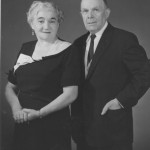 This article is the first article from a guest blogger. The author, Sandy Spencer, answers an age old question in plain language. Sandy took care of her mom who was diagnosed with Alzheimer’s so she has first hand knowledge of the condition. The article is well worth the read. You can read more of Sandy’s articles on her excellent website, Alzheimer’s Support.
This article is the first article from a guest blogger. The author, Sandy Spencer, answers an age old question in plain language. Sandy took care of her mom who was diagnosed with Alzheimer’s so she has first hand knowledge of the condition. The article is well worth the read. You can read more of Sandy’s articles on her excellent website, Alzheimer’s Support.
BTW, that picture to the left is of my paternal grandparents. My Bubie (grandmother) had Alzheimer’s before Alzheimer’s was a diagnosis. She retreated into her past when she turned 85.
I well remember going to visit her at the Hebrew Home and seeing her ‘playing cards’ with old friends. She was chatting, laughing, dealing invisible cards, etc. I remember thinking at the time that this was very sad but, as I’ve aged, I’ve come to consider that time in her life enchanting. After all, she was happy in her memories with her old friends. Not a bad way to end a life.
What is the difference between Alzheimer’s and Dementia?
I was very confused at first when writing this article as I used to think Alzheimer’s and dementia were the same thing. But, they’re not.
It’s easiest to understand if you think of dementia as a ‘catch-all’ term for some problem with the brain, memory, etc. Dementia has many diseases associated with the term, one of the most recognizable is Alzheimer’s.
So, anyone with Alzheimer’s is to have dementia but, not everyone with dementia has Alzheimer’s. For example, another recognized disease that is under the umbrella term ‘Dementia’ is Lewy Body Disease.
What is the difference between age-related memory loss and dementia?
Memory loss often accompanies aging. As we grow older, it becomes more difficult to remember things. It is common to forget a name or place, or where you left your car keys.
Most age-related memory loss has little effect on a person’s lifestyle. If they are in good physical condition, age-related memory loss should not prevent them from living alone.
As we age, though, we become more susceptible to other kinds of brain disorders. Some brain diseases can cause shrinkage and deterioration of the brain that leads to waning cognitive abilities and memory loss that mimics age-related memory loss. Yet, this type of memory loss is more serious than age-related memory loss and will cause a variety of symptoms.
Alzheimer’s, Lewy Body, Vascular dementia and Parkinson’s are a few of the diseases that can cause memory loss. Yet, each of these diseases add a new set of symptoms called “dementia” which includes memory loss as well as “cognitive decline.”
Not only does dementia affect our current memory bank, making it more difficult to remember what we already know, but it also makes it difficult to learn new things. Folks with dementia struggle with language, written or spoken. They find words confusing, spoken or written, and tend to forget quickly.
During the progression of dementia, folks also find it difficult to comprehend symbols and objects. They don’t understand the theory of hands on a clock. They don’t recognize symbols on a map, nor numbers or letters on a calendar. With this loss, they gradually lose their “sense of time” including days of the week and weeks of a month.
“Those who have dementia lose Executive Functions of the brain such as the ability to plan, reason, and solve problems, to focus and complete a task.” Alzheimers Association
Someone with age-related memory loss might misplace their car keys or forget where they are, and then suddenly find them later. Someone with dementia might hold the car keys in their hand and not have a clue what they are. It’s as though the brain is unraveling backwards.
The newest memories are forgotten first and so it goes, unraveling backwards as the person with dementia forgets their grandchildren, then their children, then husbands and wives. They may ask to “go home” continually, though they are referring to their childhood home which no longer exists.
Near the end, the person with Alzheimer’s cries out for the family of his youth; Mom and Dad and siblings who may be long deceased themselves.
This backward raveling of memory for someone with dementia is so severe that during the last stage, they no longer remember how to chew or swallow.
Though there are a few drugs to keep them calm or slow the progression, any of us who have cared for a parent or family member with this disease will tell you our constant prayer is that a cure will be found soon.
———————————–
Author: Sandy Spencer – Sandy was caregiver for her mother with Alzheimer’s and created a website as a way to share thoughts and new information learned about Alzheimer’s. Sandy can be found at her website Alzheimer’s Support Twitter@sandyalz Facebook: AlzheimersSupport

As a person who lives with Alzheimer’s I find it said on when people like you are other thinking they are educating the public. The sad part is you are hurting them and just makes it worse for what you may be trying to really help.
I’m so very sorry you find my site offensive to those with Alzheimer’s! That certainly is not my intent but, well, to each his own.
Well, I found your site to be very helpful. I hope you will have more articles that may help me. I love you dear friend!!